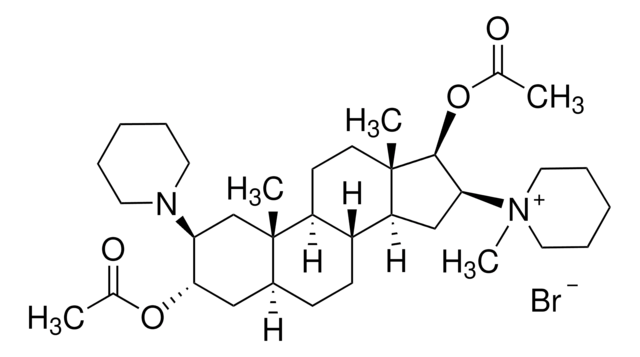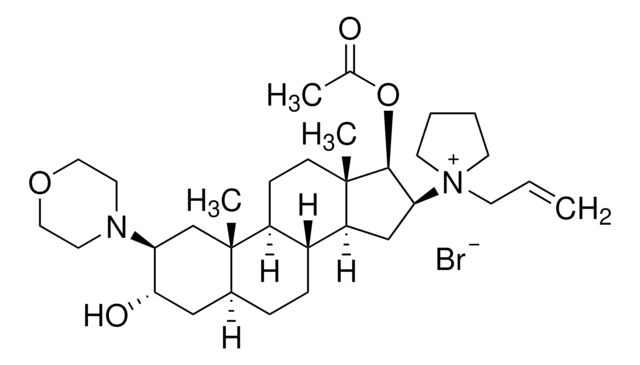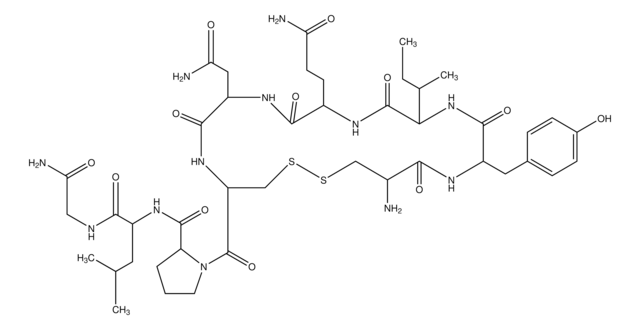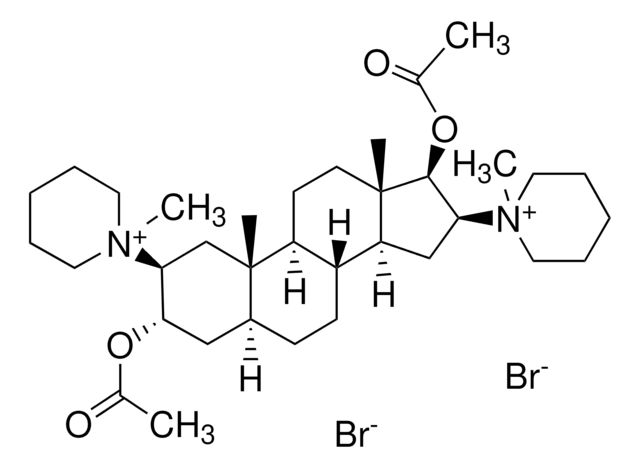1711155
USP
Vecuronium bromide
United States Pharmacopeia (USP) Reference Standard
Synonym(s):
1-[(2β,3α,5α,16β,17β)-3,17-Bis(acetyloxy)-2-(1-piperidinyl)androstan-16-yl]-1-methyl-piperidinium bromide
About This Item
Recommended Products
grade
pharmaceutical primary standard
API family
vecuronium
manufacturer/tradename
USP
application(s)
pharmaceutical (small molecule)
format
neat
storage temp.
2-8°C
SMILES string
[Br-].CC(=O)O[C@H]1C[C@@H]2CC[C@@H]3[C@H](CC[C@@]4(C)[C@H]3C[C@@H]([C@@H]4OC(C)=O)[N+]5(C)CCCCC5)[C@@]2(C)C[C@@H]1N6CCCCC6
InChI
1S/C34H57N2O4.BrH/c1-23(37)39-31-20-25-12-13-26-27(34(25,4)22-29(31)35-16-8-6-9-17-35)14-15-33(3)28(26)21-30(32(33)40-24(2)38)36(5)18-10-7-11-19-36;/h25-32H,6-22H2,1-5H3;1H/q+1;/p-1/t25-,26+,27-,28-,29-,30-,31-,32-,33-,34-;/m0./s1
InChI key
VEPSYABRBFXYIB-PWXDFCLTSA-M
Gene Information
human ... CHRNA1(1134) , CHRNB1(1140) , CHRND(1144) , CHRNE(1145) , CHRNG(1146)
Looking for similar products? Visit Product Comparison Guide
General description
Application
- Pancuronium Bromide
- Pancuronium Bromide Injection
Analysis Note
Other Notes
Signal Word
Warning
Hazard Statements
Precautionary Statements
Hazard Classifications
Acute Tox. 4 Oral
Storage Class Code
11 - Combustible Solids
WGK
WGK 3
Flash Point(F)
Not applicable
Flash Point(C)
Not applicable
Choose from one of the most recent versions:
Certificates of Analysis (COA)
Sorry, we don't have COAs for this product available online at this time.
If you need assistance, please contact Customer Support.
Already Own This Product?
Find documentation for the products that you have recently purchased in the Document Library.
Our team of scientists has experience in all areas of research including Life Science, Material Science, Chemical Synthesis, Chromatography, Analytical and many others.
Contact Technical Service![[Arg8]-Vasopressin acetate salt ≥95% (HPLC)](/deepweb/assets/sigmaaldrich/product/structures/282/717/a4c16d4f-e168-4d84-a0e3-59de3e06251e/640/a4c16d4f-e168-4d84-a0e3-59de3e06251e.png)







